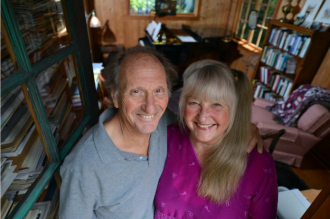Meet two of Berkeley’s best improvisers: pianist Susan Waterfall and conductor/composer Allan Pollack.
In a 90-minute conversation in their backyard cottage and music studio, the two musicians demonstrate the aplomb that has allowed them to found and — noteworthy beyond measure — sustain the Mendocino Music Festival for 31 years.
The eclectic annual gathering features artists and music from all over the world — delivered in the stunning headlands of the seaside town on the Northern California coast.
Directing a successful nonprofit endeavor for so long is a remarkable achievement, but it pales in light of the undiminished spark in their lives: enthusiasm for work that brings sensory delight to the bodies, hearts and minds of people and a community.
Waterfall and Pollack founded the festival in 1987 with Walter Green, former principal bassoonist of the San Francisco Symphony. As a Mendocino resident, Green provided numerous stakeholders and musical resources during the early years.
Waterfall, 72, brings to her work as a concert pianist an extensive history as a musicologist. As associate artistic director, her multi-media programs exploring the lives and culture of major composers — Bach, Mozart, Beethoven and in 2017, Schubert — are a highlight.
Artistic Director Pollack, 69, began as a jazz saxophonist. He holds a doctorate in composition from UC Berkeley, conducts the Symphony of the Redwoods, and has been an educator at UC Berkeley, San Francisco Conservatory of Music and other institutions.
The couple met in 1983 at a concert in which Waterfall, who lived near Mendocino, was guest pianist and Pollack was the guest conductor up from the Bay Area. The idea for a summer festival occurred to them mutually and spontaneously. Waterfall and Pollack are married and are parents of jazz pianist Julian Waterfall Pollack.
“Julian was born two weeks before the second year festival, “ says Waterfall. “He’s the festival’s child. He’s always been there. At age 7 he manifested conspicuous music abilities.”
Despite stuffing Wall Street Journal newspapers under his pillow and encouraging him to choose whatever profession produced the most joy, Pollack can’t hide pride in his son’s musical achievements.
“He’s able to speak the Beatles, Bartok, Beethoven, Oscar Peterson, hip-hop, DJ/electronics — the gestures, phrasing — he was writing music day one. He flows from genre to genre, effortlessly.”
Flow runs in the family and has to do with the ability to improvise — but so do preparation, research, perfecting “the art of wildly waving your arms around as conductor” and plodding through years of effortful training. In the mix are serendipity, appreciation of the land, respect for community, learning from mistakes.
“Ask people for money, don’t do pop concerts and bake sales,” says Waterfall, about past, unsuccessful initiatives. Above all is dedication.
“There are ups and downs because the capital in nonprofits is not money,” says Pollack. “People recognize people who are truly devoted.”
Waterfall says what has kept the festival going is multifaceted, but simple. “You just keep going,” she asserts, as if no other options exist.
Upon reflection, they identify location as a primary draw — ”The gift of good land,” says Pollack, referencing writer Wendell Berry.
Mendocino’s tight-woven community extends beyond festival goers and demonstrates trust and pride of place with over 300 volunteers and most of the financial backing, she says. “Until 2007 we rented the tent (for the 800-seat outdoor venue). The festival orchestra musicians raised $50,000 to buy a tent so we wouldn’t have to stop the festival.”
A robust Emerging Artists Program motivates the professional musicians and insures future talent for the festival.
Selecting top-tier but not necessarily big-star musicians is important. “Stars are too expensive. The main requirement is that people coming in are terrific,” says Pollack. “The talent we’ve observed is breathtaking.”
Broad range is vital: bluegrass, jazz, opera, big band, early, world, chamber and classical music.
Waterfall would like to include Indian music next season, but making sure classical music thrives will always be her priority. It’s the mystery of creative artists, brilliant people who want to make music that will keep the festival going, she suggests.
“It’s the luck of the draw,” says Pollack. “You enjoy what is. Things like the festival happen because of people, not structure. I want to share it, but I don’t want it to become a commercial biggie. I don’t want it to overrun the community.”
In the end, they say the festival is honest, honoring nature and human ability equally — with improvisation essential to the ongoing, up-and-down ride.
This year’s Mendocino Music Festival will feature more than two dozen concerts and related events from July 8-22. Full details are online at mendocinomusic.org.
